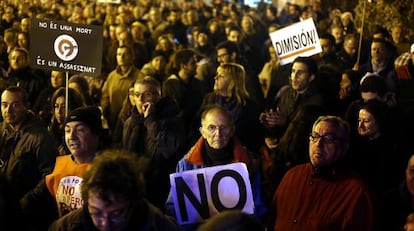The on-air demise of Canal 9
Thousands call for Valencia premier's resignation after public TV switch-off

Public television in Valencia is no more. Ràdio Televisión Valenciana (RTVV) is now history. Its demise was broadcast live by its workers until the very last moment in an atmosphere charged with emotional tension. The liquidators chosen by the regional government sought both legal and police support to overcome the employees guarding the broadcast control center at Canal 9 headquarters in Burjassot, Valencia. In the end they chose to cut off the power in order to definitively turn off the center's costly and complex digital equipment. At 12.19pm last Friday the image froze before going black.
It was the end of a 24-year-old story that included highs and many lows. So many, in fact, that Valencia regional premier Alberto Fabra surely never predicted the reaction of the tens of thousands of people who once again took to the streets of Valencia and Alicante on Saturday to protest the closure of the loss-making broadcaster, and to demand the Popular Party (PP) politician's resignation and the calling of early regional elections.
Neither would Fabra have predicted the radical change in the editorial line RTVV took after the announcement of its closure on November 5. The network had become reviled as an instrument of the PP regional government's power, losing its credibility and its audience and becoming embroiled in multiple corruption, waste and cronyism scandals. But it woke up when it saw the end, taking a more critical line against Fabra's decision and the PP's management of both the regional government and RTVV. Opposition representatives have appeared more on RTVV in the past month than in the last 10 years. The network reported on previously avoided topics such as the Gürtel kickbacks-for-contracts corruption scandal, including the part of the investigation regarding Canal 9's broadcasting of Pope Benedict XVI's visit to Valencia, for which the Gürtel group received backhanders worth over three million euros. Last week the judge extended the reporting restrictions on the case affecting RTVV and several opposition politicians have linked the decision to close the network as soon as possible with the investigation.
The opposition was on RTVV more in the last month than it had been in a decade
As a result many citizens and members of the public who had turned their back on Canal 9 and even demanded its closure for its manipulation and continuing failure to comply with the objectives established in its founding laws, have come out in its defense.
"We didn't agree with the editorial line or the reporting on Canal 9, but it was our television and we have to defend our culture and language," commented protestor María Tébar, 49, at Saturday's demonstration. One of RTVV's main objectives was to promote the Valencian language.
Opposition representatives from the regional Socialist Party (PSPV-PSOE), Compromís and Esquerra Unida have united in describing the closure as a coup d'état, demanding Fabra's resignation and the calling of early elections. They calculated that reducing the staff to 700 and lowering salaries, among other measures, would allow the network to keep going for another two years on the 130 million euros that its closure will cost. The regional government questioned their figures and regretted that the staff had not accepted salary cuts earlier.
In the run-up to RTVV's demise workers inside the Burjassot production center began a news program that lasted 12 hours as their colleagues crowded at the gates outside, blocked from entering by police. The most symbolic moment was when they managed to smuggle in, via a side entrance, Beatriz Garrote, the president of the association representing victims of the 2006 Valencia metro accident. RTVV had followed the orders of the Valencian government by hushing up the derailment that left 43 dead and not a single politician found responsible.
Workers managed to enter the building and blocked the corridor giving access to the control center. The technician contracted to cut the signal, Francisco Signes, nicknamed "Paco Telefunken," made himself a hero on the social networks by refusing to do so live on air. The resistance finally ended after the liquidators filed a complaint for seizing the installations and coercion with the summary court, which was accepted by the judge. In the end a subcontracted operator cut the signal by switching off the power, causing serious damage to the high-tech equipment. It was the only thing that wasn't shown during the on-air death of Canal 9.
Tu suscripción se está usando en otro dispositivo
¿Quieres añadir otro usuario a tu suscripción?
Si continúas leyendo en este dispositivo, no se podrá leer en el otro.
FlechaTu suscripción se está usando en otro dispositivo y solo puedes acceder a EL PAÍS desde un dispositivo a la vez.
Si quieres compartir tu cuenta, cambia tu suscripción a la modalidad Premium, así podrás añadir otro usuario. Cada uno accederá con su propia cuenta de email, lo que os permitirá personalizar vuestra experiencia en EL PAÍS.
¿Tienes una suscripción de empresa? Accede aquí para contratar más cuentas.
En el caso de no saber quién está usando tu cuenta, te recomendamos cambiar tu contraseña aquí.
Si decides continuar compartiendo tu cuenta, este mensaje se mostrará en tu dispositivo y en el de la otra persona que está usando tu cuenta de forma indefinida, afectando a tu experiencia de lectura. Puedes consultar aquí los términos y condiciones de la suscripción digital.








































